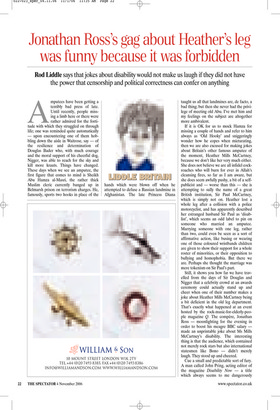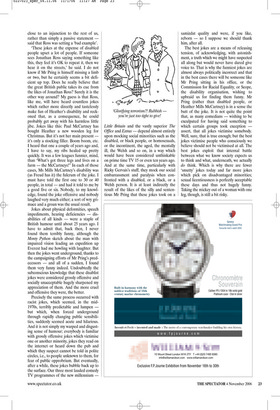Jonathan Ross’s gag about Heather’s leg was funny because it was forbidden
Rod Liddle says that jokes about disability would not make us laugh if they did not have the power that censorship and political correctness can confer on anything Amputees have been getting a terribly bad press of late. Until recently, people missing a limb here or there were rather admired for the fortitude with which they struggled on through life; one was reminded quite automatically — upon encountering one of them hobbling down the aisle in Waitrose, say — of the resilience and determination of Douglas Bader who, with much courage and the moral support of his cheerful dog, Nigger, was able to reach for the sky and kill more krauts. Things have changed. These days when we see an amputee, the first figure that comes to mind is Sheikh Abu Hamza al-Masri, the rather thick Muslim cleric currently banged up in Belmarsh prison on terrorism charges. He, famously, sports two hooks in place of the hands which were blown off when he attempted to defuse a Russian landmine in Afghanistan. The late Princess Diana taught us all that landmines are, de facto, a bad thing; but then she never had the privilege of meeting old Abu. I’ve met him and my feelings on the subject are altogether more ambivalent.
If it is OK for us to mock Hamza for missing a couple of hands and refer to him always as ‘Old Hooky’ and sniggeringly wonder how he copes when micturating, then we are also excused for making jokes about Britain’s other famous amputee of the moment, Heather Mills McCartney, because we don’t like her very much either. She does not believe we are all infidel cockroaches who will burn for ever in Allah’s cleansing fires, so far as I am aware, but she does seem awfully pushy, a bit of a selfpublicist and — worse than this — she is attempting to sully the name of a great British institution, Sir Paul McCartney, which is simply not on. Heather lost a whole leg after a collision with a police motorcyclist, and has apparently described her estranged husband Sir Paul as ‘disablist’, which seems an odd label to pin on someone who married an amputee. Marrying someone with one leg, rather than two, could even be seen as a sort of affirmative action, like busing or wearing one of those coloured wristbands children are given to show their support for a whole roster of minorities, or their opposition to bullying and homophobia. But there we are. Perhaps she thought the marriage was mere tokenism on Sir Paul’s part.
Still, it shows you how far we have travelled from the days of Sir Douglas and Nigger that a celebrity crowd at an awards ceremony could actually stand up and cheer when one of their number makes a joke about Heather Mills McCartney being a bit deficient in the old leg department. That’s exactly what happened at an event hosted by the rock-music-for-elderly-people magazine Q. The compère, Jonathan Ross — moonlighting for the evening in order to boost his meagre BBC salary made an unprintable joke about Ms Mills McCartney’s disability. The interesting thing is that the audience, which contained not merely rock stars but also international statesmen like Bono — didn’t merely laugh. They stood up and cheered.
Cue a small and predictable sort of fury. A man called John Pring, acting editor of the magazine Disability Now — a title which always seems to me dangerously close to an injunction to the rest of us, rather than simply a passive statement said that Ross was setting a ‘bad example’.
‘These jokes at the expense of disabled people upset a lot of people. If someone sees Jonathan Ross saying something like this, they feel it’s OK to repeat it, then we hear it on the streets,’ he said. I do not know if Mr Pring is himself missing a limb or two, but he certainly seems a bit deficient up top. Does he really believe that the great British public takes its cue from the likes of Jonathan Ross? Surely it is the other way around? My guess is that Ross, like me, will have heard countless jokes which rather more directly and tastelessly make fun of Heather’s disability and reckoned that, as a consequence, he could probably get away with his harmless little jibe. Jokes like this: Paul McCartney has bought Heather a new wooden leg for Christmas. But it’s not her main present — it’s only a stocking filler. Boom boom, etc. I heard that one a couple of years ago and, I have to say, my ribs healed up pretty quickly. It was a few leagues funnier, mind, than ‘What’s got three legs and lives on a farm — the McCartneys!” In each of those cases, Ms Mills McCartney’s disability was (as Freud has it) the fulcrum of the joke. I must have told the first one to 30 or 40 people, in total — and had it told to me by a good five or six. Nobody, to my knowledge, found the joke offensive and nobody laughed very much either; a sort of wry grimace and a groan was the usual result.
Jokes about physical deformities, speech impediments, hearing deficiencies — disabilities of all kinds — were a staple of British humour until about 25 years ago. I have to admit that, back then, I never found them terribly funny, although the Monty Python sketch about the man with impaired vision leading an expedition up Everest had me howling with laughter. But then the jokes went underground, thanks to the campaigning efforts of Mr Pring’s predecessors — and all of a sudden, I found them very funny indeed. Undoubtedly the subconscious knowledge that these disablist jokes were considered grossly offensive and socially unacceptable hugely sharpened my appreciation of them. And the more cruel and offensive they were, the better.
Precisely the same process occurred with racist jokes, which seemed, in the mid1970s, terribly predictable and lumpen but which, when forced underground through rapidly changing public sensibilities, suddenly seemed acute and hilarious. And it is not simply my warped and disgusting sense of humour; everybody is familiar with grossly offensive jokes which victimise one or another minority, jokes they read on the internet or heard down the pub and which they suspect cannot be told in polite circles, i.e., to people unknown to them, for fear of public opprobrium. But eventually, after a while, these jokes bubble back up to the surface. Our three most lauded comedy TV programmes of the new millennium — Little Britain and the vastly superior The Office and Extras — depend almost entirely upon mocking social minorities such as the disabled, or black people, or homosexuals, or the incontinent, the aged, the mentally ill, the Welsh and so on, in a way which would have been considered unthinkable on prime time TV 15 or even ten years ago. And at the same time, particularly with Ricky Gervais’s stuff, they mock our social embarrassment and paralysis when confronted with a disabled, or a black, or a Welsh person. It is at least indirectly the result of the likes of the silly and sententious Mr Pring that these jokes took on a samizdat quality and were, if you like, reborn — so I suppose we should thank him, after all.
The best jokes are a means of releasing tension, of acknowledging, with astonishment, a truth which we might have suspected all along but would never have dared give voice to. That is why the funniest jokes are almost always politically incorrect and that in the best cases there will be someone like Mr Pring sitting in his office, or the Commission for Racial Equality, or Scope, the disability organisation, wishing to upbraid us for finding them funny. Mr Pring (rather than disabled people, or Heather Mills McCartney) is in a sense the butt of the joke. It is not quite the point that, as many comedians — wishing to be exculpated for having said something to which certain groups took exception assert, that all jokes victimise somebody. Well, sure, that is true enough; but the best jokes victimise people who consciously we believe should not be victimised at all. The best jokes exploit that internal battle between what we know society expects us to think and what, underneath, we actually do think. Which is why there are fewer ‘smutty’ jokes today and far more jokes which pick on disadvantaged minorities; sexual licentiousness is perfectly acceptable these days and thus not hugely funny. Taking the mickey out of a woman with one leg, though, is still a bit risky.



















































































































 Previous page
Previous page